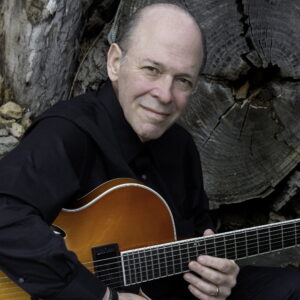MMW guitar teacher studied with guitar greats

As a teacher of Music Maker Workshops in Ahwatukee, Dr. Steve Kinigstein helps his students master the strings of guitar and ukeles.
As a composer and professional musician, Kinigstein by his own account is an explorer traversing an endless universe of sounds and melodies.
"My favorite thing about being a musician is the joy of discovery," he said. "Whether I am playing or composing there is always something new that pops up. When I am teaching, I love the moment of epiphany when the expression on the face of a student tells me something new has just clicked."
He recalled that when he started learning the guitar at age 8, "music had a compound and somewhat complex role in the early years of my life" as he discovered that music was "transporting to me" and "it brought my own curiosity to the table".
At age 14 tragedy struck when his father passed away and because he had no siblings he could share his grief with, he found comfort in music. He practiced for hours before and after school and throughout the weekend so much that he became a "musical recluse" for about a year.
Kinigstein's desire to play in a band ended his grieving period and soon he was off on a musical odyssey that deepened his passion for music and expanded his reportoire.
His formal education included a bachelor's degree from Manhattan School of Music and a master's degree and doctorate from Columbia University in New York.
His informal education, though, included studying under some of the great guitarists and composers of several generations.
He studied guitar with masters of the instrument, such as Jim Hall, George Bensen, Ike Isaacs, and Harry Leahy. Recommended for the doctoral program in Columbia by the late composer Milton Babbitt, who earned a reputation for his work in electronic music. Kinigstein studied composition under some of the giants in composing, including Ursula Mamlok, David Rakowski, Mario Davidovsky, Giampaolo Bracali and George Edwards.
While living and New York and going to school there, he earned his living performing as a substitute guitarist in the orchestra of several Broadway shows, including, "Grease" and "They're Playing our Song" and "Shenandoah," and as a studio guitarist for recordings and commercials as well as teaching privately.
In 2009, he began writing for just Jazz Guitar magazine. Leading him to a friendship with his idol, Mundell Lowe, the late American Jazz guitarist who worked in radio, television, and film as a session guitarist.
Kinistein wrote and delivered Lowe's eulogy at his funeral.
Lowe had chosen Kinistein to produce his final CD, "Poor Butterfly" which rose to #58 on the national Jazz "Top 100" chart and still gets air-play in the USA and abroad.
Kinistein's teaching career began in the Los Angeles Unified School District in 1998, where despite a two-year battle with cancer, he was the band and orchestra director and served as chairman of the instrumental music. He also created and designed the guitar course for the district. He was also a clinician on a national level, giving seminars to improve the effectiveness of guitar teachers who were working in secondary classrooms.
A Mesa resident since 2020, Kinistein recently wrote a biography on Lowe.
He also teaches students of all levels at Music Maker Workshops and composes.
"Being a trained composer, I, of course, write my own music," he said. "I don't really have what I call a definitive process. I do have some of my own rules to which I strictly stick. If I'm composing for guitar, I never have my own instrument in my hands."
"This comes from a studious avoidance- even a fear- of composing to my own technique rather than the pure musical idea. I always let that which I've written sit overnight because I revise or develop it further. I never show anyone until I am absolutely finished."
As he looks at his career as a performer, a highlight for him was his appearance at 18 in the Atlanta Pop Festival in Georgia at the stadium that holds the Braves games.
"Waiting in the dugout and watching the other performers until it was time to go on, I was sitting among stars such as Frank Zappa, Steve Winwood, and Duane Allman, Albert King, my favorite blues guitar player was sitting right next to me, holding his guitar. Summoning up my courage, I asked him if he was going to play my absolute number one favorite Albert King tune, 'As the Years Go Passing By'.
"I was shocked when he handed me his guitar and said, "no, why don't you". I copied and learned the solo from the song note for note. By some miracle, my nerves- which were already in fifth gear- didn't force me to choke. When I finished playing it, I handed him back his guitar. He just looked at me and said, 'That's right boy, you're doing it right'. I couldn't believe what had just happened - right in front of Zappa, Winwood, and Allman."
He said he likes to tell his students to, "get a clear idea of their musical goals." "These will evolve through time." "If you stick with it, you will achieve them."
